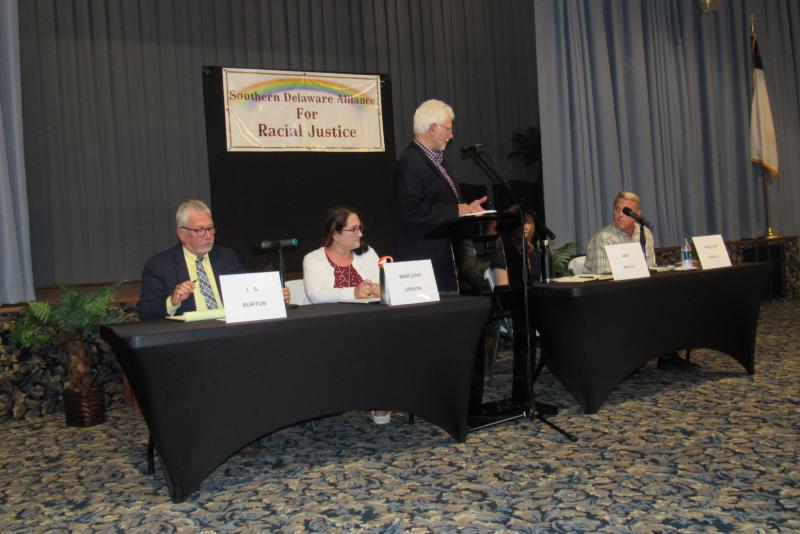Affordable and workforce housing problems outweigh solutions
More problems than solutions were revealed at an affordable housing town hall meeting Sept. 11.
A major problem is defining criteria for workforce and affordable housing, said panelist and Sussex County Councilman I.G. Burton. “I’ve been on county council for two years and I’m just getting the definitions of what we’re talking about,” he said. “I think I’m talking about workforce housing, but I’m actually talking about affordable housing. We need to simplify it, then talk about zoning and goals.”
Burton said county council is not currently doing anything to address the program. “We’ve never really looked at if from a county perspective,” he said. “I’m here tonight and on council now to try to change that because it’s only going to get worse.”
Burton was joined by developer Preston Schell, Discover Bank Assistant Community Reinvestment Act Director Amy Walls, and Delaware State Housing Authority Director of Policy and Planning Marlena Gibson on a panel held by the Southern Delaware Alliance for Racial Justice at Trinity Faith Christian Center in Lewes. Gibson said the last health and needs assessment conducted by the Delaware State Housing Authority showed significant demand for rental housing and home ownership in Sussex County.
Walls agreed, and said some developers have built rental properties under federal programs for lower-income families in eastern and western Sussex counties, but they have not built many for-sale affordable homes. “They can’t find properties to buy in Sussex County for people at lower income levels,” she said. “They’re just not there.”
Schell said very few programs support developing workforce housing in Sussex County. “In the beach area, it’s gone,” he said. “County needs to act, or it’s only going to get worse.”
Schell said workforce and affordable housing should be near public transportation, shopping, sewer and water districts, and job centers. “But when you find properties like that, you have neighbors and they show up at hearings to say it’s a horrible location,” he said. “When you ask for a non-horrible location, there’s silence, or they tear into you.”
Schell said people in eastern Sussex County shouldn’t be pushed farther and farther west to find affordable places to live. “We need to have these people live close to where they work,” he said. “Every time I sell a property to a wealthy retiree from out of state, I’m indirectly stabbing myself in the back.”
Schell said he was generalizing, but after many people move to Sussex County and buy their homes, they do not want anyone else to do the same. “They don’t see the hypocrisy,” he said.
Schell said he is open to ideas and financing strategies to target local workforce housing. He said he is currently developing workforce housing on a Savannah Road property in Lewes.
Burton said providing workforce housing will keep the county vibrant, but he sees difficulty in developing a plan for a county so divided. “County sees it as a needful thing to do, but hasn’t defined either workforce or affordable housing,” he said. “The county is divided, and we need to develop a plan for both, but that’s difficult because property and income levels are so different.”
During a question-and-answer session, audience members said people released from jail have difficulty finding affordable housing because criminal backgrounds are often seen as risks by lenders and government programs. Attendees said housing programs for those with disabilities are also needed.
Walls and Gibson told the audience to contact state and federal representatives about the lack of affordable and workforce housing. “Your voice needs to be strong and heard from repeatedly,” Walls said.























































